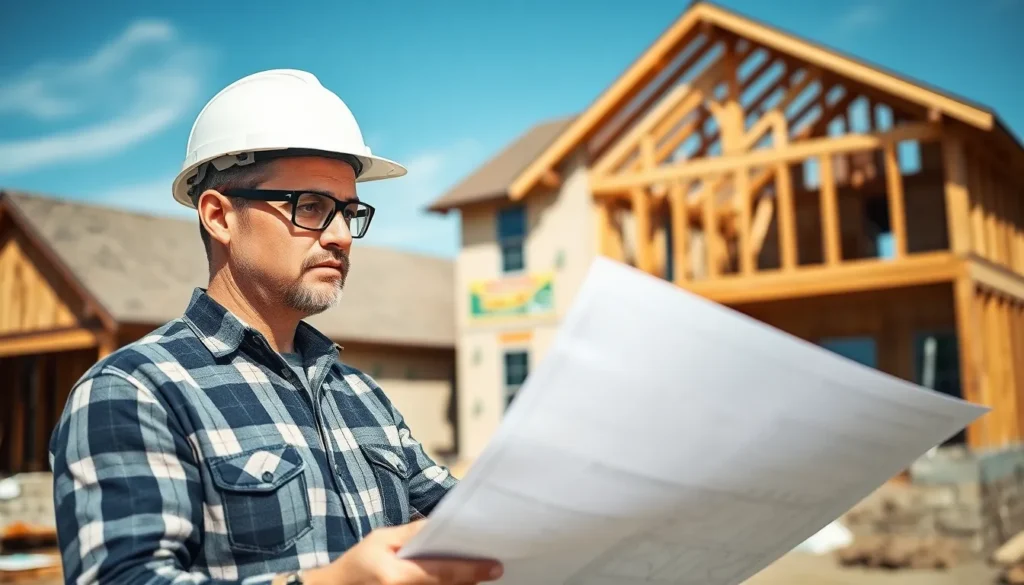Finding the right home building contractor can feel like searching for a needle in a haystack, especially when that needle has a penchant for disappearing at the worst possible moments. With so many options out there, it’s crucial to choose a contractor who not only knows their way around a blueprint but also understands your vision. After all, you want someone who can turn your Pinterest dreams into reality without turning your budget into a horror story.
Table of Contents
ToggleOverview of Home Building Contractors
Home building contractors lead the construction process from planning to completion. These professionals coordinate various aspects of home construction, including budgeting, scheduling, and management of subcontractors. Skilled contractors understand local building codes, zoning regulations, and permit requirements, ensuring compliance throughout the project.
Selecting the right contractor involves assessing their qualifications, experience, and track record. Homeowners benefit from checking references and previous projects, ensuring alignment with personal styles and needs. Reliable contractors typically possess good communication skills, fostering a trusting relationship with homeowners.
Pricing structures vary among contractors. Most offer fixed-price contracts, while others may use hourly rates or cost-plus models. Homeowners must seek clear, detailed quotes to avoid unexpected expenses. Successful contractors provide transparency in pricing, facilitating informed decisions.
Quality home building contractors often emphasize teamwork. Collaborating with architects, designers, and suppliers enhances project outcomes. These professionals adapt to changes and unforeseen challenges, maintaining flexibility throughout the construction process.
Customer satisfaction plays a significant role in a contractor’s reputation. Positive reviews and testimonials frequently indicate a contractor’s ability to deliver on promises. Building a positive relationship with clients often results in referrals, expanding a contractor’s business opportunities.
Developing a solid contract ensures that expectations and responsibilities are clear. Most contracts outline the scope of work, timeline, payment schedules, and project deliverables. Homeowners must review contracts thoroughly to protect their interests and avoid disputes.
Effective home building contractors combine expertise and communication skills to bring homeowners’ visions to life. By focusing on quality, transparency, and collaboration, these professionals can successfully navigate the challenges of home construction.
Types of Home Building Contractors

Understanding the different types of home building contractors helps homeowners make informed choices during construction projects. Each contractor type specializes in specific aspects of building.
General Contractors
General contractors oversee entire construction projects. They coordinate labor, manage schedules, and ensure that the project adheres to building codes. Typically, they hire and supervise subcontractors, such as electricians and plumbers, providing a streamlined process from planning to completion. Experience in managing diverse teams significantly contributes to a general contractor’s effectiveness. Homeowners often rely on them for budgeting, ensuring that financial resources are allocated properly throughout the project.
Specialty Contractors
Specialty contractors focus on specific trades within the construction process. These professionals include electricians, plumbers, and HVAC technicians, each with specialized skills and knowledge. Coordination with general contractors is crucial, as it ensures that all specialty contractors align with the overall project timeline and quality standards. Hiring specialists guarantees high-quality work in their field, resulting in better outcomes for complex installations. Many homeowners engage specialty contractors to address unique requirements or compliance needs in their projects.
Choosing the Right Home Building Contractor
Finding the ideal home building contractor requires careful consideration. Effective selection hinges on several key factors.
Key Factors to Consider
Licensing and insurance represent crucial elements when evaluating contractors. Always verify that the contractor holds valid licenses and the necessary insurance. Experience in various project types shows adaptability and expertise. A solid reputation reflects positive past performances. Additionally, checking the contractor’s portfolio offers insights into their style and quality of work. Budget alignment is essential; obtaining comprehensive quotes can prevent unexpected costs. Communication skills often impact project cooperation, so assessing how well a contractor listens and responds is vital. Lastly, understanding the contractor’s approach to project timelines can ensure alignment with your expectations.
Questions to Ask During Interviews
Inquiring about recent projects helps gauge a contractor’s current capabilities. Ask for references to speak directly with past clients about their experiences. Discuss project timelines and how they plan to manage potential delays. Request details about their subcontractors and ensure familiarity with the subcontractors’ credentials. Understanding payment structures can clarify financial expectations, so ask about deposit requirements and payment schedules. Additionally, explore how they handle changes during the project. Confirming handover procedures at project completion is essential, ensuring clarity on final inspections and warranties.
Evaluating Contractor Credentials
Evaluating credentials ensures homeowners select the most qualified contractors for their projects. This approach focuses on vital aspects like licensing, insurance, and reviews.
Licensing and Insurance
Licenses demonstrate that a contractor meets local legal and professional standards. Homeowners must verify that the contractor holds appropriate licenses for the specific trade and region. Insurance, on the other hand, protects both the contractor and the homeowner in case of accidents or property damage during construction. Requesting a copy of the contractor’s insurance policy is essential to verify coverage. The combination of valid licensing and adequate insurance not only offers peace of mind but also reflects a contractor’s commitment to professionalism.
Online Reviews and Testimonials
Online reviews provide insights into a contractor’s reliability and previous project outcomes. Homeowners should seek testimonials from various platforms, including Google, Yelp, and specialized construction review sites. Positive feedback often signifies a contractor’s ability to deliver quality work and maintain strong client relationships. Reading through both positive and negative reviews helps homeowners understand potential strengths and weaknesses. Gathering personal recommendations from friends or family can also supplement online findings. Prioritizing contractors with consistent positive reviews equips homeowners with essential information for making informed decisions.
Cost Considerations
Budgeting for a home construction project requires careful attention to various cost factors. Homeowners often face a spectrum of expenses, including labor, materials, permits, and unexpected costs. Understanding these elements enables more accurate financial planning.
Labor costs represent a significant portion of the total budget. Contractors frequently charge based on their experience and expertise. Higher-quality contractors may demand higher rates but often provide better results.
Materials costs fluctuate based on market conditions. Sourcing quality materials leads to increased durability and overall project value. It’s important to balance cost and quality during material selection.
Permits add another layer of expense. Local jurisdictions require specific permits for construction activities, impacting timelines and budgets. Homeowners must factor in these costs early in the planning phase.
Unexpected costs frequently arise during the construction process. Changes in project scope, site conditions, or design adjustments often result in additional expenses. Establishing a contingency fund helps manage these financial surprises.
Contractor pricing structures come in various forms, such as fixed-price contracts or time and materials agreements. Homeowners should compare quotes from multiple contractors to ensure competitive pricing. Comprehensive and transparent quotes prevent misunderstandings regarding expected expenses.
Effective communication with contractors about budget considerations enhances the overall process. Openness about financial capabilities allows contractors to offer solutions that align with homeowner expectations. Regular budget reviews during construction keep projects on track and within financial limits.
Navigating cost considerations during home construction involves understanding labor, materials, permits, and potential unexpected expenses. Awareness of pricing structures and maintaining ongoing communication with contractors strengthens a homeowner’s financial management throughout the project.
Finding the right home building contractor is essential for a successful construction project. By prioritizing qualifications and communication skills homeowners can ensure their vision is realized while staying within budget.
Taking the time to evaluate credentials and gather feedback from previous clients helps build a foundation of trust. Understanding the various pricing structures and potential costs associated with home construction is crucial for effective financial planning.
Ultimately a strong partnership with a skilled contractor can lead to a seamless building experience that meets expectations and enhances the overall satisfaction of turning a house into a home.





